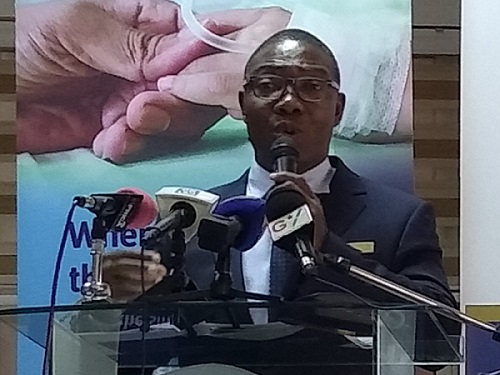David Klutse addressing the media at the forum
Managing Director of Intravenous Infusions (IIL), David Klutse, has warned the public of a growing catastrophe in the health sector if government does not step in to ban the importation of rigid IV (intravenous) bottles.
Apart from the products not meeting World Health Organisation (WHO) standards, the increase in the importation of such substandard products, he revealed, was having an economic impact on local pharmaceutical industries since more health facilities were switching from the IV collapsible bags to rigid bottles.
“Anytime we import one of these products, the money that comes into this country in terms of value added tax (VAT) is given to someone in India or China,” he disclosed.
Mr. Klutse made the remarks when he addressed brokers, investors and the media Friday in Accra during his company’s turn of ‘Facts Behind The Figure’, a flagship programme of the Ghana Stock Exchange (GES).
Company’s Performance
According to him, revenue increased by 23.4 per cent from GH¢16.37 million in 2017 to GH¢20.21 million in 2018 while operating profit after tax went up by four per cent at GH¢2.84 million as against GH¢2.73 million in 2017.
Earnings per share were announced to be 1.254 pesewas; an increment of 4.0 per cent as compared to the previous year.
Despite the improved performance of the company, Mr. Klutse indicated that arrangement by government to reduce the selling unit price of drugs by 25 per cent due to pressure on the National Health Insurance Authority (NHIA) budget had affected the revenue base, as the company had to explore other avenues to sell more of its products.
He also bemoaned the long delays in payment by the NHlA to health facilities and the perennial depreciation of the cedi as some challenges which were being faced by the company within the external environment.
As part of the company’s target for 2019, he disclosed that the company was, among other things, working to introduce six new products within the next 18 months, increase market share to 65 per cent, increase revenue to 24 million and also collaborate with government to address rigid IV bottles.
“We want to re-establish West African presence in Côte d’Ivoire and Burkina Faso and increase contribution to total revenue by five per cent,” he stated.
Mr. Klutse also announced that the company would also benefit from a $4.2 million stimulus package from the government.
A professor of anaesthesia, Prof. Mrs. Gladys Amponsah, who is also a member of the board of directors at IIL, explained that rigid bottles, unlike the collapsible bags, require constant monitoring and have a higher risk of air contamination that might lead to possible deaths through air embolism.
Air embolism, she explained, occurs when there is blockage of blood supply vessels caused by air bubbles in the human organ, which may be as a result of air in IV drips, trauma, surgery and decompression sickness.
“When you put the rigid bottle on a patient, within some few minutes, it will stop and you will have to puncture the bottle with a needle because it does not collapse from atmospheric pressure,” Prof. Amponsah highlighted.
By Issah MohammedP


